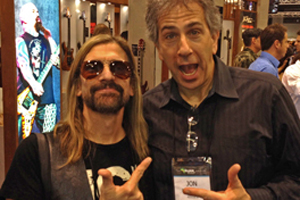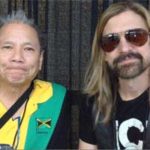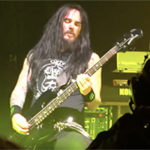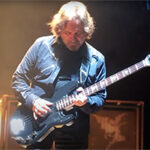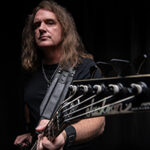The “go to” bass player for heavy rock and metal tells FBPO about those gigs with David Lee Roth, Megadeth, Ozzy and Slash!
Exclusive interview with FBPO’s Jon Liebman
December 5, 2011
James LoMenzo has been described as one of the more enduring bassists in the music business. Over the course of a career that has spanned nearly three decades, James has recorded and toured with some of the most noteworthy rock icons of our time, including Dave Mustaine, Zakk Wylde, David Lee Roth, Ozzy Osbourne, Slash, Ace Frehley and many others. His fluid, aggressive style and “at home” stage presence have made people think of LoMenzo as the “go to” bass player for heavy rock and metal.
FBPO: Tell me about your musical upbringing. I understand you come from quite a musical family.
JL: Well Jon, most of my family were more music enthusiasts than musicians, except for my grandfather Angelo. He was a first-generation Italian immigrant who performed in what I guess you’d call Italian style vaudeville. He played mandolin, guitar and sang. I guess back in the day they had theater nights in the neighborhood, kind of like in the Godfather movies. I’ve got a glass-pressed 78 record that my mom gave to me of him singing and playing. I need to get that transferred and check it out.
My Dad loved music and was really encouraging when he realized I was obsessed by it. When I was very young we’d sit around and listen to tons of stuff. He of course was into the Italian crooners like Jerry Vale, Frank Sinatra and all that. I loved the orchestration back then although, at 5 years old, I’m sure I wasn’t aware of exactly what all those sounds were, but it captivated me. A few years later, the Beatles come around and, no surprise to me, my Dad embraced it. So now my records were in the stack with his. It was a great time for music: Ray Charles, The Rolling Stones, Sinatra … such a rich mixture of old and new styles and all on the radio!
When I was around 7, my folks got me my first electric guitar. Before that I was struggling with my grandfather’s old Harmony acoustic. It was impossible to hold down those strings for too long. My Uncle Larry had a job at Billboard magazine and, through some liaison with their publishing department, he was able to wrangle up the sheet music of the day. He’d bring me shopping bags full of it! This was killer for me because I was just learning how to read charts and it was great to have piles of music at my disposal. We didn’t have a lot of money when I was a kid, so it was a great gift!
FBPO: I bet most people would be surprised to learn of your classical background, playing French horn in school orchestras and other ensembles.
JL: Well, when I got into junior high, I was really “feeling my oats” as a musician. I spent my last year of public school with my guitar, going from class to class, singing for as many classes that would let me. I had a good voice back then. The teachers loved for me to come in and break up the day.
Anyway, back to junior high, the first day of music class, the teacher was holding up band instruments and explaining what they were and how they sounded. When he picked up the French horn, all he said was, “This is the hardest instrument to master in the whole orchestra!” I was like, “That’s for me!” So, I set on to get it down and found that he was half right: It was difficult, but not impossible. I got on with it pretty well and it helped me understand how orchestras work, arranging and theory. I worked my way up to the first chair every time. It carried me right up until college!
FBPO: How did you end up as a bass player?
JL: When I was around 11, my cousin, who was a stellar musician in his own right, was all about Jimi Hendrix. He said, “Ya gotta check out Hendrix!” He had the giant posters and black light stuff in his room. He kept playing the live set from Woodstock II. I was totally lost. I remember telling him, “It just sounds like a long, distorted open E chord to me! What is he doing?!” I just didn’t get it. I finally saw some footage of him in a movie. It was tough back then to see live performances because we didn’t have 300 channels of cable, home video decks or the Internet. We saw the Woodstock footage in the movie theater and at that moment I knew two things: Jimi Hendrix was God and I was a mere mortal.
At that point I couldn’t fathom where to go on guitar, so I thought maybe I’d switch to bass and keep singing. A year later, I was up at summer camp, which was run by my music teacher and based around the performing arts. There were people from all over the world there and it was a pretty rich experience. I got involved in theater and orchestra and joined my first rock band as the singer! There was a fellow there who I believe was named Gene. He looked a bit like Keith Richards. He was playing bass, but could really care less about it. He had a Gibson EB3, the one with the bridge pickup. He let me try it and even offered to let me use it in the rock band. I loved it! It was exactly what I was looking for. It made this great expansive sound and it seemed to make it easier for me to become more a part of the band. I also dug being more like the drummer in that I’d have my own space in the band.
After camp, I went home and immediately took the top two high strings off my guitar. I put down my pick and started plucking the notes individually with my fingers the way I did on Gene’s bass. I even remember turning down the tone control on my amp to get it sound more “basslike.” I was cruising along pretty good at that point, learning the bass parts to Beatles songs and Elton John stuff. I loved Dee Murray! Everything on the radio was bass-driven back then and I couldn’t get enough of it. I finally bought a cheap bass from a friend, which cost me $30.00 + $10. It needed a D string, which I bought for $10, without realizing a string should cost a third of that price. What was I getting myself into?
FBPO: You’ve done so much in the rock/heavy metal world. How did that whole part of your career get started?
JL: I think, like most musicians my age, it started with the Beatles. That was my trajectory from early on. They were a rock band, yet they were such an undeniable cultural movement and a stamp of creative freedom. It was hard not to want to emulate them in some facet, be it through performance, writing, recording, style… It set a course for a lot of musicians I’ve known and most of the bigger “Metal Gods” I’ve worked with.
In all candor, I’ve never really seen myself strictly as a heavy metal musician, though I’ve always been hired as such. I learned to love metal through living it, actually. When I joined White Lion, I never thought for a moment they were a heavy metal band. Some of the music postured that way and I thought that was fine, in context. I really understood that Judas Priest, Iron Maiden, Dio, Metallica, Megadeth, etc., were the definitive genre metal bands as I was coming up. I embraced it like everyone else, but I also saw it as one style of music, not the full range, which I believe is its greatest strength: its singularity to its own unity of music, style and community. That’s what I love about it. Ahh, but I digress…
That was just the trajectory! The actual start of it was playing in cover bands and block parties in my teens. We got paid, so that qualified. Later, at around 19, I got involved with (Rainbow drummer) Bobby Rondinelli and his brother Teddy. Ray Gillen (Bad Lands) joined with us after a while and I suppose that is when I officially went “heavy.” A year or so later is when I ended up joining White Lion and had all that sweet ’80s success. The rest was just one blurry band/record/tour after another.
FBPO: How did it feel entering – and subsequently leaving – Megadeth, in light of all the tension between Dave Mustaine and David Ellefson?
JL: I had just finished up with Black Label Society and, quite frankly, wasn’t really looking for another band at that time. My buddy Allen Steelgrave over at ESP Guitars calls me up one day and says, “I’ve got a band for you. You interested?” I’m like, “Wait, who are we talking about?” He goes on to say, “I can’t really say, but they’re one of the big metal bands.” So I immediately guess Megadeth and Allen continues on to say, “Can’t tell you, so get together a disk and bio of some of your most metallic music.” I quickly retort, “For Megadeth?!” He says, in frustration, “Just send it to me!”
Three days later, I get a call from Dave Mustaine and, after a short meeting, he offered me the spot! It was at first exhilarating, ’cause I knew how great their music was, but then reality set in. I’d have to learn some twenty-two songs in one month and, frankly, I only knew five. So that was a mindbender, but once I got a grip on it, it was a fantastic experience. Megadeth fans are some of the best fans in the world. I know, ’cause I’ve met a lot of ’em [Laughs].
Anyway, David Ellefson. After I spent a few years in Megadeth, I started seeing this side of Dave Mustaine that wanted to really unify Megadeth and its past history. I met David Ellefson at Bass Player Live! two years ago and, in fact, it was the first time I’d ever met him. We went out and had coffee and chatted a bit. As anyone will tell you, he’s the nicest guy. I mentioned that it would be a great time to reach out and maybe post some info about himself on the Megadeth boards. I knew the fans would love to hear from him. He said he’d think about it. That was the last I’d heard of it.
A few years later, he and Dave Mustaine had contacted each other. Now I’m both happy and a little sad to say he rejoined. Even though it meant stepping down, I was really pleased it was David Ellefson returning. In the public’s eye, he’s a big part of what people know as Megadeth and it’s just so great to see him up there playing those great bass parts that he wrote!
FBPO: Let’s touch on just a few career highlights. Tell me about the David Lee Roth gig.
JL: Playing with David Lee Roth was really special. The guy was a class act all the way! We had so much fun and played so much music and, man, when he stepped on that stage, it always felt like The Greatest Show On Earth! He just has that presence! We did this “Sam & Dave” tour, as it was dubbed in 2002. It was so much fun! We basically played a Van Halen set every night and Dave was spot on, jumping and leaping all over the place! He sang the shit out of those songs! Ray Luzier was playing drums and, of course, he was phenomenal. Ray brought me into the band. Brian Young was on guitar and he was just on the money with the Eddie Van Halen stuff.
FBPO: How about Ozzy Osbourne?
JL: Ozzy was great! I worked on the Ozzmosis album in L.A. and up in Tahoe with him and the band. I also sang some backups on “No More Tears.” Really warm funny guy. He’d hold court and it would be the best excuse to shirk working on stuff. Sharon was quite nice too. They seemed to really care about their personnel. I thought the record was coming out great. Zakk was on fire! Michael Wagner originally mixed it then they revamped it. The label rep told Wagner it wasn’t what they wanted. The guy actually said the label wanted it to sound more “Seattle.” I could barf! Anyway, they ended up re-recording most of it, but there’s a few of my parts still on there, so I’m happy about that. When I listened to the finished product, I was tickled because at that time, my hero, Geezer Butler came in. He replayed a lot of the songs along with the new “Seattle-inspired” drums. I was astounded that he played a lot of what I had done in a similar fashion. Made me feel I had the right sensibility when I approached it initially.
FBPO: And Slash?
JL: Slash was another one of those “musicians who love music.” I loved playing with him because he just got so much joy from it! I thought, as a player, he had outstanding range, much more than people give him credit for. We’d record everything at rehearsals and some of the jams we did were really radical. Even got into some southern influences. He was great! We toured, I think in ’95, and went on for another year working up material, but it never really panned out.
FBPO: You mentioned Zakk Wylde. You’ve done quite a bit with him, too.
JL: Zakk is and will always be my personal hero on the guitar. My favorite of them all, hands down. The shear power with which he hits those strings is just something I’ve never seen anybody else do. It’s really bombastic! I hooked up with him in 1988 and we were as thick as thieves for many years. Always seemed effortless to make music with him. Prolific as the day is long.
My favorite music that we recorded has got to be some of the Pride & Glory and Book of Shadows stuff. By the time I caught up with him in Black Label Society, he had moved on to the dropped tuning, heavier than heavy music, and that was a blast! I needed no less then 3,000 watts of power to keep up with that sonic assault. That’s what ultimately got me into using sound-enhancing pedals. Anything I could think of to get in the game with the Mighty Zakk.
FBPO: Having done all those gigs and all those tours, you’ve got to have at least one really good road story you can share!
JL: One? Just about any would get me sued!
- Who spat beer in James Hetfield’s face? Can’t tell you!
- Who broke into and climbed up the Eiffel Tower at 2:00 am and narrowly escaped capture by the Jean Dam? Can’t tell you!
- Which guitar player leapt over the hotel bed and got his hands around the lead singer’s throat screaming, “I’m going to kill you!!!”? Still can’t tell you!
I think you get the picture. Not too many “flowery” moments in rock & roll, I’m afraid.
FBPO: What else is keeping you busy these days?
JL: Well, let’s see. Aside from picking up the assorted phone call for Dio Disciples, George Lynch, HAIL! and just about anyone else who falls into the “OMG, our regular bass player can’t do these gigs! Who do we call?” category, I’ve been recording bass for my super producer buddy, Elan Morrison, on DMC’s and Bobby Brown’s new albums, which is a phenomenal kick for me. He and I are working on all kinds of metal and less “alloy-driven” musical projects, too.
I’m also moving along with my new production company, Monster House Productions. We’ve been doing all kinds of exciting projects, mostly video-driven right now. Most recently, we’ve produced some product demo videos for Aphex and Ashdown. The plan is to start from “A” and work our way down through all the musical equipment manufacturers alphabetically [Laughs]. We’re also working on a documentary about a famous rock & roll eatery in Hollywood.
Monster House has been a great challenge and it’s really creative. Ultimately, it’s gratifying when the client says “We Love it! Let’s post it!” My favorite part is scoring the things and accenting all the features. I use mostly basses. My guitar is usually too far to reach all the way on the other side of the room. [Laughs]
FBPO: When was the last time you picked up a French Horn?
JL: When I cleaned up my storage space last month, it was blocking a cabinet. [Laughs] Actually, I rented one for the Pride and Glory album. There was a song called “Sweet Jesus” that I thought would be perfect for a horn passage. My arrogance told me that I could bone up on my horn playing in a week. Physiology told me otherwise! The muscles in my mouth that used to be my “embouchure” had atrophied in direct accordance with the passage of some fifteen years. When I got in the room with the mics, it was definitely less than stellar. Anyway, there’s no horn solo on “Sweet Jesus.” If I still have good wind, maybe that will be part of my retirement. I still love the instrument.
FBPO: What lies ahead for you and your career? What would you like to do that you haven’t accomplished yet?
JL: We’re planning a DVD bass tutorial out of Monster House. It will be informative, but not boring. I’ve been working on the nucleus of a band. Writing the music is easy. Finding the right personnel is not as easy, but that’s being stoked at the present. I’ve been talking about a bass album for about ten years now. That’s something I’d like to get to.
FBPO: What would you be if you weren’t a bass player?
JL: I’d definitely have been a photographer, maybe a photojournalist. Life’s the story, but capturing it in a photo can be a story in itself! I love a good story.
